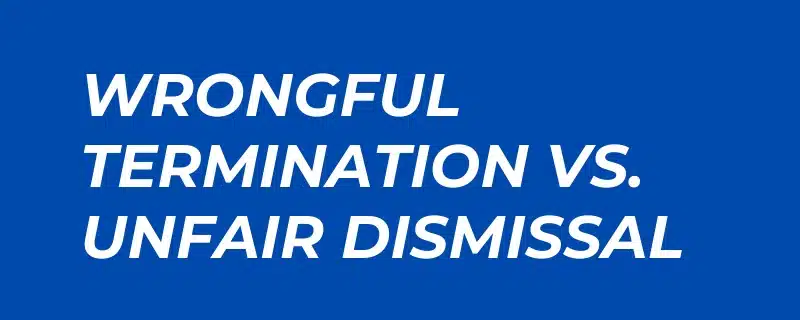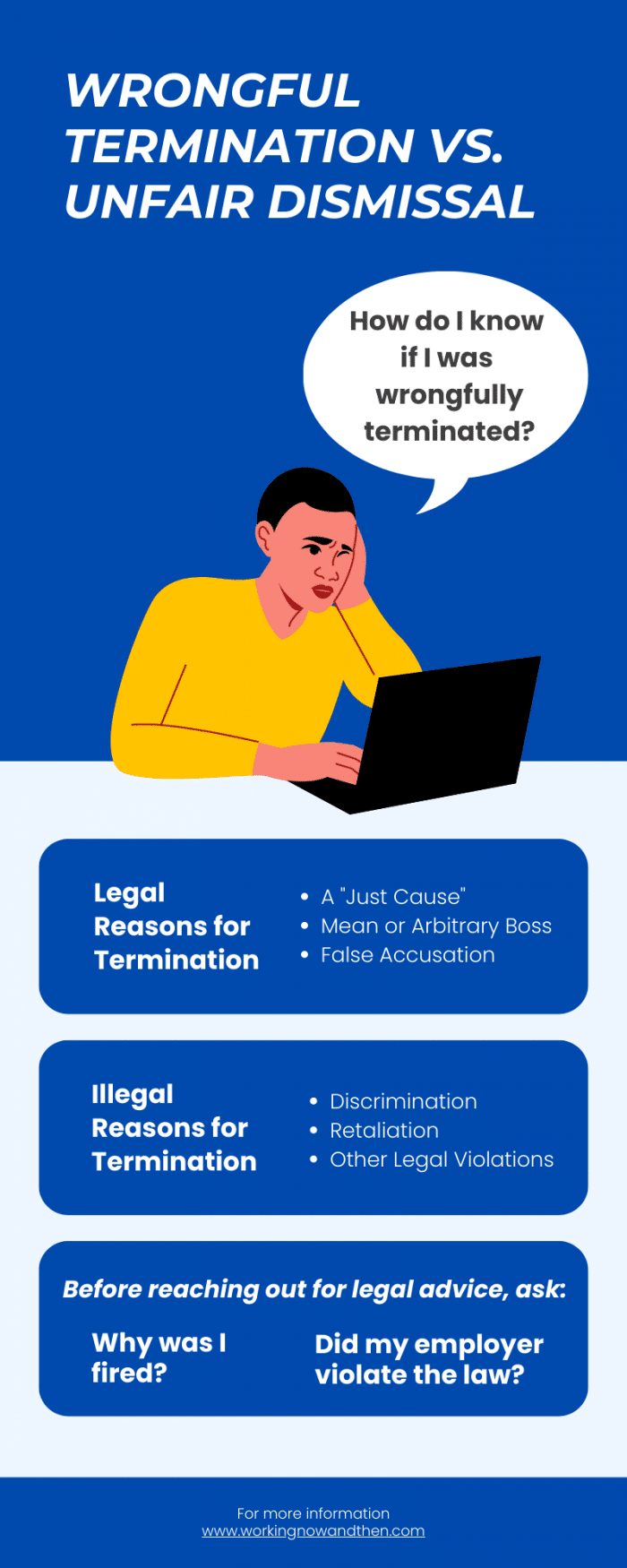
Wrongful Termination vs. Unfair Dismissal: Reasons for Termination Without Cause
January 20, 2024
By Charles Joseph, Employment Lawyer
As an employment lawyer, I frequently answer questions about wrongful termination. Recently, someone contacted me to complain that he’d been fired for no reason. While it’s unfair for your employer to fire you without a reason, legally, it doesn’t qualify as wrongful termination. It’s legal to fire someone without “just cause” in virtually any state. In fact, employers can fire someone for no cause, a bad cause, or even a knowingly false cause.
If you’ve been fired, you probably want to know, “How do I know if I was wrongfully terminated?” Getting fired is stressful and traumatic. But before contacting an employment lawyer, it’s important to understand the difference between a merely unfair termination of employment and actionable wrongful termination.
So what is the difference between unfair dismissal and unlawful termination?
Reasons for Termination
One question hits almost everyone who’s been fired: How do I know if I was wrongfully terminated? That’s a normal question to ask. But there’s a big gap between the public perception of being fired wrongfully and the legal definition of wrongful termination.
You can legally be fired for a good reason, a bad reason, or no reason at all.
-Charles Joseph, NYC Employment Attorney
The legal definition of wrongful termination is very specific. Unless your firing meets specific criteria, you may not have a legal remedy.
Here’s what qualifies as wrongful termination: your employer fires you for an illegal reason. In practice, that means your employer has to violate the law for an unfair dismissal to turn into an illegal firing.
As I often tell potential clients, “You can legally be fired for a good reason, a bad reason, or no reason at all.”
It’s frustrating when you feel wronged by your company but they didn’t break the law. So how can you tell the difference between being fired for a bad reason versus an illegal reason?
Here are two of the most common reasons people reach out to me about wrongful termination: mean bosses and false accusations. In most cases, neither meets the legal definition of wrongful termination.
Reasons for Termination without Cause: Mean Boss
Stories about mean bosses are all too common. Some bosses never seem satisfied with their employees. And sometimes, mean bosses can cross the line into abusive behavior such as yelling or bullying.
The phrase “hostile work environment” sounds like it fits these situations perfectly. Bosses can turn a productive, professional workplace into a stressful, toxic environment through their actions. But unfortunately, in most situations, having a mean boss, even a very mean and arbitrary boss, doesn’t qualify as a hostile work environment. And it is completely legal for a mean boss to terminate employees without cause or even for a bad reason they know to be untrue.
Want to know more about hostile work environments? Check out our FAQ on What is a Hostile Work Environment?
Lawful Reasons for Termination of Employment: Falsely Accused
“My coworker falsely accused me and now I got fired.” It’s a situation I see often. But the law doesn’t protect employees from being fired after a false allegation.
Does that mean supervisors can fire workers for untrue accusations? It sounds unbelievable, but your employer can legally fire you for a false accusation, even if you can prove it’s a lie.
Unfair Employment Termination
Unfortunately, employers can fire people for unfair reasons. For example, your boss can fire you because they don’t like you or you’re not a “good fit” for the role.
But it’s important to take a deeper look at these unfair dismissal examples. An unfair firing becomes illegal if your boss fires you because of a disability, your race, or membership in any of the other protected categories. And not being a “good fit” is often a euphemism for gender, race, or sexual orientation discrimination. In my experience, it’s not uncommon for people fired out of bigotry to be told they are not a “good fit.”
What’s the line between an illegal vs. unfair firing from a job?
An unfair dismissal can look very much like wrongful termination. Here’s a recent example from my practice: a worker complained to HR about their boss’s bad behavior at work. Then the boss fired them.
But is it wrongful termination? Unless the worker complained about illegal behavior – sexual harassment, workplace discrimination, shareholder fraud, or wage theft, for example – the supervisor can legally fire the worker no matter how good the worker’s performance or how long the worker’s track record.
Wrongful Termination and At-Will Employment
Can you sue for wrongful termination in an at-will employment state? At-will employment makes it sound like employers can fire workers for any reason at all. But you can file a wrongful termination lawsuit in an at-will state. That’s because even in at-will states, employers can’t fire people for illegal reasons.
What are some illegal reasons for termination? Here are a few examples:
- Workplace Discrimination: The law protects you from discrimination at work. That means your employer cannot fire you because you’re in a protected category. You cannot be fired for your gender, race, religion, sexual orientation, age, or other protected reasons.
- Retaliation: Say an employee complains about discrimination, unpaid overtime, or another violation of their rights. Or say an employee testifies in a discrimination lawsuit against the company. The employer can’t fire them as an act of retaliation.
- Acting as a Whistleblower: Whistleblowers report illegal or dangerous actions. Unfortunately, many employers fire whistleblowers as an act of retaliation. The law defines that as wrongful termination.
State laws offer additional protections. For example, in New York you’re protected from wrongful termination if you complain about any illegal actions. In New Jersey, you’re also covered if you complain about your employer doing something unethical.
When to Reach Out for Wrongful Termination Legal Advice
Let’s go back to that first question: How do I know if I was wrongfully terminated? Before contacting an employment lawyer, ask these wrongful termination legal questions:
#1: Why was I fired?
This might be a difficult question to answer, especially if your employer did not give a reason. But dig deeper into the circumstances around your dismissal. Was your termination part of a larger layoff? Were you on a performance improvement plan? Or were you in a probationary period? In most cases, employers can legally fire employees in these circumstances.
#2: Did my employer violate the law?
Did your employer violate your rights or break the law when they fired you? Unless you’re an employment lawyer, you might not know the answer. But there are some clear warning signs that your dismissal might break the law.
Consider this situation: you recently complained to HR or your boss about discrimination, wage theft, or another violation. Then your supervisor fired you. That can count as retaliatory firing.
Or consider another situation: your boss recently complained that you’re not “cut out for the job,” hinting that it’s because of your gender, race, or age. If you’re fired, it could be a discriminatory firing.
If you’re not sure whether your employer broke the law, contact an employment lawyer. Many offer free consultations on your legal rights.
Most people that contact us are understandably upset that they were unfair fired, sometimes maliciously fired. But unless the termination was motivated by discrimination or retaliation, I can lend an ear but cannot sue. All is not lost – if you were wrongfully but not illegally terminated, you can use that information to win your unemployment hearing.
-Charles Joseph, NYC Employment Attorney
For more information on your rights, visit our resource on wrongful termination.
Charles Joseph has over two decades of experience in employment law and wrongful termination. He is the founder of Working Now and Then and the founding partner of Joseph and Kirschenbaum, a firm that has recovered over $140 million for clients. Think you were a victim of wrongful termination? Reach out for a free consultation today.
